#Land Transportation Franchising and Regulatory Board (LTFRB)
Text
LTFRB 24/7 HOTLINE

#philippines#department of transportation#dotr#ltfrb#land transportation franchising and regulatory board#ltfrb 24/7 hotline
0 notes
Text
NO TO JEEPNEY PHASEOUT !!!!!!
SAY HELLO TO A WORSENED TRANSPORT CRISIS BY 2024
By: Mariella Angela H. Olden (December 28, 2023 | 9:25 PM)
Following a meeting with transportation officials, President Ferdinand Marcos Jr. said on December 12 that no further extensions for consolidation of public utility vehicles (PUV) shall be granted.
One of the cultural markers of Philippine identity is the jeepney. Jeepneys have been the primary mode of transportation for Filipinos due to its affordability and accessibility, particularly for students and workers. Furthermore, it has traditionally been the primary occupation of drivers and operators.
In June 2017, the government established the Public Utility Vehicle Modernization Program (PUVMP), intending to replace and eventually phase out traditional jeepneys to improve public transportation. However, with the impending phaseout of jeepneys by December 31, 2023, drivers and operators will be forced to purchase costly modern vehicles supported by the government.
Data from the Land Transportation Franchising and Regulatory Board (LTFRB) indicates that five days before the consolidation deadline, 31,058 traditional jeepneys, or 73.5% of them in Metro Manila, have yet to be consolidated. These unconsolidated units are highly not a minority.
Why should drivers, operators, commuters, and workers fight back? Among the many effects of the PUVMP is the increase in the minimum fare that will continue to make Filipinos suffer. The PUV Modernization program is a business. Corporations and large businesses will take over and have the advantage of raising fares to pay for expensive "modern jeeps." In contrast, this is a big disadvantage to the families of the drivers and operators, who will sink into debt due to the burden of the monthly payment of the modernized vehicle.
In addition, the Department of Energy and LTFRB has reported that the number of registered vehicles in the Philippines exceeds 9 million. Just over 250,000, equivalent to 2% of jeepneys, make up the total.
More detrimental effects of this program include the modern jeepney being way more expensive than the traditional jeepney. The price of a typical jeepney ranges from P150,000 to P250,000. The cost of operating a modern e-jeepney will rise by 1,766.7% to P2.8 million for drivers and operators. Although P160,000 will be given as a subsidy according to LTFRB, which amounts to a mere 5.7% of the jeepney's entire cost, jeepney drivers will be forced to make at least more earnings each day to be able to settle their loan if they were to switch to the modern jeepney.
By the year 2024, the mass transport crisis in the country will worsen. The government cannot fill such a large and significant gap in public transport in the country. With the influx of imported cars, many local manufacturers and industries will be affected.
The PUVMP program is forcefully erasing one of the main parts of our identity as Filipinos and only in favor of a few rich and foreign interests, making the Filipino masses suffer, further impoverished, and left behind.
Drivers, operators, commuters, and workers—
Unite and fight for #NoToJeepneyPhaseout #NoToPUVPhaseout #NoToPUVModernizationProgram!
#philippines#news article#news writing#journalism#writer#publication#jeepney#notopuvphaseout#notojeepneyphaseout#notopuvmodernizationprogram
19 notes
·
View notes
Text
OPINION: STOP THE E-JEEP! #NoToJeepneyPhaseout
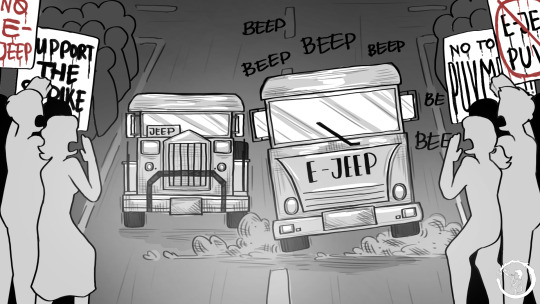
Commuter or not, every Filipino is familiar with jeepneys. Once dubbed “King of the Roads”, jeepneys are a symbol of Philippine culture and resourcefulness, as they were made from converted jeeps left by American troops after World War II. As the most popular public transport vehicle in our country for decades, these jeepneys are now at risk of disappearing, causing public uproar.
The controversy surrounding the phasing out of jeepneys first sparked in 2017 when the government launched the Public Utility Vehicle Modernization Program (PUVMP). The program’s goal is to replace the old model jeepneys with modern electronic jeepneys (e-jeeps) that are claimed to guarantee cleaner emissions and improved safety. This has been met with several worries that could adversely affect the Filipino populace.
Public unrest over the jeepney phaseout has been going on for years. The consolidation deadline for Public Utility Vehicles (PUVs) which included jeepneys, UV Expresses, and Filcab units was extended three times. The first was due to the COVID-19 pandemic and multiple protests from transport groups, which affected the government’s original plan to consolidate PUVs in March 2020. As a result, it was rescheduled at the end of last year, December 31, 2023. The second extension was on January 31, 2024, to allow unconsolidated PUVs to ply their routes with the stipulation of being barred from joining cooperatives and corporations. The third and “final” deadline was on April 30, 2024—three months after the last deadline—to allow driver-operators one last time to consolidate, or else they would not be allowed to ply their routes. Amid these several deadlines, protests and strikes are unwavering as dissents push for the PUVMP to be suspended, arguing that imposing deadline extensions does not address the structural problems of the modernization program.
One day before the “final” deadline, the Land Transportation Franchising and Regulatory Board (LTFRB) declared that unconsolidated jeepneys have a 15-day leeway to continue their usual routes before they are impounded. Again, this is another smokescreen from the systemic issues brought by the modernization program. The PUVMP must be suspended, as it ostensibly presents more problems than solutions. If the PUVMP truly is for the people, why is there a persistent and contentious pushback by the public?
Enforcing deadlines and giving grace periods for jeepney drivers only delays—the government must suspend the PUVMP and reevaluate its effectiveness. Displacing and disenfranchising jeepney drivers from their livelihoods defeats the purpose of an inclusive and sustainable program as the PUVMP endorses itself to be.
Who are those affected?
Jeepney drivers are most affected by the modernization program. If they choose not to consolidate with cooperatives and corporations or cannot afford an e-jeep alone, their vehicles will be impounded, taking away their only source of income. Additionally, commuters, UP Diliman constituents, and other sectors also have to bear the cost of the PUVMP due to the policies and funds allocated to this program.
The transport group for jeepney drivers, Pagkakaisa ng mga Samahan ng Tsuper at Opereytor Nationwide, more commonly known as PISTON, is the leading opposition group against the PUVMP. First established in 1981, PISTON serves as an organization that aims to promote the welfare and democratic rights of jeepney drivers. In 2013, they launched a campaign against the oil price hike, directed at the country’s main petroleum companies, namely Petron, Shell, and Chevron. Since the government has revealed plans to phase out jeepneys over 15 years old, they have been organizing protests against the PUVMP, criticizing its anti-poor policies and prioritizing for-profit corporate consolidation.
The PUVMP pressures jeepney drivers to switch to e-jeeps or new combustion engine vehicles that meet Euro IV emission standards which only permit carbon monoxide (CO) emissions of 1.0g/km for gasoline and 0.5g/km for diesel vehicles. Units and parts that make up the e-jeep are imported from other countries, which is why they are priced as high as PHP 3 million. While the modernization program offers subsidies of PHP 160 thousand through loan programs by the Development Bank of the Philippines (DBP) and the Land Bank of the Philippines (LBP) to help offset the costs, this amount is only 5.7% of the total cost of a modern jeepney. Jeepney drivers state that they will need to make around PHP 3.5 thousand each day to pay off the debt from switching to an e-jeep, but at the moment, they only make around PHP 2 thousand a day.
The large amount of money that needs to be spent transitioning to modern e-jeeps is the main concern of dissent to this program. Replacing a huge fleet of jeepneys requires massive resources, taking away from vital sectors such as education and healthcare. Additionally, the PUVMP disproportionately affects low-income citizens—specifically, jeepney drivers who mostly come from low-income families and struggle to meet the high e-jeep cost. The debt burden forces them to work longer hours just to break even, negatively impacting their livelihood. Jeepney drivers worry that the transition to e-jeeps or new combustion engine vehicles will exacerbate their financial burdens and force them to work longer hours just to break even.
Furthermore, units from local manufacturing companies such as eFrancisco Motor Corporation and Sarao Jeepneys are still priced at around PHP 2.5 million, further putting jeepney drivers at odds with the financial burden of the PUVMP. With large corporations dominating the market and the PUVMP’s policy to consolidate driver-operators to cooperative-led fleets, this raises concerns of corporate takeover and the economic marginalization of jeepney drivers. Since large companies are the ones who have the capacity to fully adhere to the program, jeepney drivers are left disenfranchised because of their financial disadvantage.
Commuters are also affected heavily by this program. Modern jeeps usually charge higher fares because, aside from the initial cost of modernization, their maintenance and repair costs are higher than the traditional jeepneys’. This adds more financial problems to Filipinos already facing higher living expenses as a result of inflation rates. Moreover, unfamiliar technology could present a significant challenge for traditional drivers transitioning to modern jeepneys, leading to potential operational difficulties and increased maintenance expenses.
Constituents of UP Diliman (UPD) share similar concerns. The UP Transport Group (UPTG), which consists of jeepney drivers from all routes around the campus such as Ikot, Toki, UP-Pantranco, UP-Philcoa, and UP-Katipunan, organized a silent strike on December 13, 2023, in protest of the earlier December 31 deadline. Based on interviews with the UPD Vice Chancellor for Community Affairs Roehl Jamon, UP jeepney drivers may have to comply with the modernization. According to Jamon, the only two options they have are for the university to pay for the units themselves, which cost about PHP 1.4 to 3 million each, or for the university to partner with transport cooperatives that already own modernized units and invite them to service the campus, which is the less expensive option between the two. Although the latter is cheaper, this still gives way for corporations to take advantage of the modernization program.
Jeepneys are extensively used by UP college students and students of UP Integrated School (UPIS) for commuting to and from the university campus because they charge less than other PUVs. However, these fares could be completely changed by the PUVMP’s effect on jeepney availability and rates, possibly altering their daily commutes by making them spend more on transport alternatives or by forcing them to look for different routes. This might put additional financial burden as well as longer hours of travel in their everyday life, affecting not only their academic performance but also their general welfare.
Moreover, the PUVMP is taking attention and funding from other sectors that have more pressing needs. In particular, the Department of Education (DepEd) is significantly impacted by lack of funding. Classroom and teacher shortages have been notable areas of concern with an estimated 165,444 classrooms and nearly 90,000 teachers needed. According to DepEd, PHP 105 billion would be needed each year up until 2030 to address the classroom shortage, while PHP 5.6 billion would be needed to hire 20,000 teachers in the upcoming school year, as discussed in the Senate plenary deliberations on the proposed 2024 national budget. Aside from the education sector, the Department of Health (DOH) has been grappling with vaccine shortages, namely pertussis, which has led to 54 infant deaths since the beginning of the year. According to the United Nations Children’s Fund (UNICEF), in 2022, the Philippines was among the top 5 contributors to the 18 million zero-dose children in the world. Despite this and multiple warnings from health authorities, the Philippines still hasn’t fully addressed this vaccine gap, leaving one million unvaccinated Filipino children vulnerable and susceptible to life-threatening diseases such as polio, measles, and tuberculosis. In light of these issues, resources should be prioritized in these matters instead of the PUVMP. Action must be taken immediately to address these pressing concerns and ensure the well-being of the Filipino people.
Are E-jeeps really the “better option”?
According to a study by the Center for Energy, Ecology, and Development (CEED), jeepneys only make up about 2% of the total registered vehicles in the nation and PUVs only contribute about 15% of the total particulate matter emissions in Metro Manila. If the PUVMP aims to transform our public transportation into becoming more sustainable and environmentally friendly, this number does not justify the relentless pressure on jeepney drivers to consolidate. The PUVMP will only contribute 2% to the country’s vehicles that cause pollution. This raises the question of the significance of its impact on saving the environment and reducing emissions in the long run. Additionally, modern jeepneys still run on fossil fuels, such as petroleum oil, defeating the purpose of the program’s goal of creating a more environmentally friendly public transport system. In the same study by CEED, it was argued that solely focusing modernization efforts on jeepneys to reduce air pollution would be negligible. Taking this into account, the government should instead consider upgrading traditional jeepneys to meet the proposed emission standards which would be cheaper for the program.
Furthermore, as said in a paper by the UP Center for Integrative and Developmental Studies, drawing from the current rate of assembly of modern jeepneys, it will take an estimated 270 years before all traditional jeepneys in the country are replaced. This begs the question of why the government keeps enforcing deadlines when it will take almost three centuries before all jeepneys are replaced with e-jeeps.
The PUVMP, while well-intentioned, presents a flawed solution. The environmental costs being too high, the unjust burden on the poor, and the uncertain consequences of such a drastic transition are strong arguments for reconsideration. The government should consider other options like rehabilitating existing jeepneys and using cleaner-burning fuels. One example that can be improved with the government’s help is the rehabilitated jeepney proposed by the Libmanan Transport Service Cooperative (LIBTRASCO). This model includes all government-specified features of the modernized jeepney—such as a side door, a higher ceiling, bigger windows, and even stabilizers to account for the increased height. Compared to e-jeeps, these rehabilitated models only cost around PHP 400 thousand to PHP 500 thousand, making them more affordable for jeepney drivers. Though the rehabilitated jeepney still uses the jeepney’s diesel engine, it can still be adapted to use a Euro 4 engine and even include air conditioning. If the government chooses to work with LIBTRASCO and retrofit the rehabilitated jeepney as an alternative, the Philippines can then improve its transport system while keeping its traditional jeepneys and people’s livelihoods by prioritizing affordability, inclusiveness, and a sustainable future.
Modernization shouldn’t be at the expense of the workers. The primary reason why many are aggressively opposing the program is that the welfare of jeepney drivers was not carefully considered when they should be the center of the solution. For the past years that the modernization program has been implemented, instead of listening to the pleas and concerns of jeepney drivers, commuters, and other constituents, the government has kept imposing the jeepney consolidation and resisting any demands by the public.
Taking all of this into account, we must request the government to prioritize policies that consider the money and power of all citizens, especially those from poor backgrounds. This includes subsidizing the move towards modern vehicles or examining other options that do not oppress marginalized communities. Instead of pushing jeepney drivers to consolidate and buy e-jeeps, the government should consider exploring and supporting initiatives that use cleaner-burning fuels and retrofitting existing jeepneys to meet emission standards to help maintain the environment in its sustainable state without overhauling the iconic jeepney fleet.
Above all else, this transition must be led by the workers—jeepney drivers whom the public has relied on for decades. Development must be made with the public in mind, not without.
// by Kela Alcantara & Xia Mentes
References:
Abarca, C. (2024, March 21). Calabarzon, Metro Manila top classroom shortage list – DepEd. INQUIRER.net. https://newsinfo.inquirer.net/1921036/fwd-on-public-classroom-shortage#:~:text=The%20estimated%20total%20number%20of,country’s%20classroom%20shortage%20by%202030
Ansis, JC (December 14, 2015). "Piston: Continuing to fight for the transport sector". CNN Philippines. https://web.archive.org/web/20190131083905/http://cnnphilippines.com/news/2015/12/14/piston-protests-continuing-to-fight-for-transport-sector.html
Bautista, P., Moya, R. (2023, September 3). Jeepney modernization program: Drivers have a steep price to pay. Philstar.com. https://www.philstar.com/headlines/2023/09/03/2293549/jeepney-modernization-program-drivers-have-steep-price-pay
CEED Office. (2018, November). Just Transition in the Philippines. CEED. https://ceedphilippines.com/just-transition-in-the-philippines/
Conde, M. (2019, November 16). Transport coop makes pitch for ‘affordable, safe’ rehabilitated jeepney. RAPPLER. https://www.rappler.com/nation/244909-camarines-sur-transport-cooperative-rehabilitated-jeepney/
Dimalanta, R. Atienza, J. Samonte E. (2023). Putting Transport Workers and Commuters First: The Route to Just Transition in Public Transport Modernization. UP CIDS Policy Brief. ISSN 2619-7286.
Gatarin, G. (2024), Modernising the ‘king of the road’: Pathways for just transitions for the Filipino jeepney. Urban Governance. 4(1). 37-46. https://doi.org/10.1016/j.ugj.2023.11.002
Golez, P. (2024, January 24). Marcos extends jeepney consolidation deadline til April 30. POLITIKO. https://politiko.com.ph/2024/01/24/marcos-extends-jeepney-consolidation-deadline-til-april-30/daily-feed/
Latoza, G. (2023, December 15). What are UP’s plans for commuters amid PUVMP? Tinig ng Plaridel. https://www.tinigngplaridel.net/up-transport-puvmp/
Magramo, K. (2024, January 16). Philippines jeepneys: Will the loud, colorful vehicles soon disappear from the roads?. CNN. https://edition.cnn.com/2024/01/16/asia/philippines-jeepney-phase-out-strikes-intl-hnk/index.html
Mendoza, T. C. (2021, February). Addressing the “blind side” of the government’s jeepney “modernization” program. University of the Philippines Center for Integrative and Developmental Studies. 1-69. ISSN 2619-7456.
Mondoñedo-Ynot, L. (2024, April 10). April 30 is final deadline for Puv Consolidation. SunStar Publishing Inc. https://www.sunstar.com.ph/manila/april-30-is-final-deadline-for-puv-consolidation
Ombay, G. (2023, November 9). DepEd lacks nearly 90,000 teachers - Pia Cayetano. GMA News Online. https://www.gmanetwork.com/news/topstories/nation/887851/deped-lacks-nearly-90-000-teachers-pia-cayetano/story/
Pabustan, D. (2017, September 21). Euro 4, what does it mean and why do we need it?. AutoDeal.https://www.autodeal.com.ph/articles/car-features/euro-4-what-does-it-mean-and-why-do-we-need-it
Philippine Daily Inquirer. (2024, April 14). DOH’s Lack of Vaccine Urgency. INQUIRER.net. https://opinion.inquirer.net/172935/dohs-lack-of-vaccine-urgency
Presidential Communications Office. (2024, January 24). PBBM approves three-month extension of PUV Consolidation. https://pco.gov.ph/news_releases/pbbm-approves-three-month-extension-of-puv-consolidation/
RAC. (n.d.). Euro 1 to Euro 6 guide – find out your vehicle’s emissions standard. https://www.rac.co.uk/drive/advice/emissions/euro-emissions-standards/
Relativo, J. (2023, December 28). Unconsolidated jeepneys, UV Express “allowed to operate” until Jan. 31, 2024. Philstar.com. https://www.philstar.com/headlines/2023/12/28/2321963/unconsolidated-jeepneys-uv-express-allowed-operate-until-jan-31-2024
Relativo, J. (2024, April 30). Unconsolidated jeepneys given “15-day leeway” after consolidation deadline. Philstar.com. https://www.philstar.com/headlines/2024/04/30/2351543/unconsolidated-jeepneys-given-15-day-leeway-after-consolidation-deadline
Reyes, R. O. (2024, January 29). Jeepney drivers rejoice “partial victory” for phaseout extension. SunStar Publishing Inc. https://www.sunstar.com.ph/tacloban/jeepney-drivers-rejoice-partial-victory-for-phaseout-extension#:~:text=approved%20the%20extension%20for%20franchise
Rivas, R. (2023, March 7). In numbers: Why jeepney phaseout is anti-poor, will do little for environment. RAPPLER. https://www.rappler.com/business/numbers-why-government-phaseout-jeepneys-anti-poor-do-little-environment/
Santos, J. (2024, February 7). Consolidation extension is not what the protest demands. Philippine Collegian.https://phkule.org/article/1106/consolidation-extension-is-not-what-the-protest-demands
7 notes
·
View notes
Text
Jeepney Strike
On November 19, 2023, ABS-CBN TV Patrol reported that the Land Transportation Franchising and Regulatory Board (LTFRB) is seeking a dialogue with the transport group in an attempt to persuade them to call off the planned three-day nationwide transport strike beginning November 20. “To Piston, there’s still time. LTFRB is just one call away if you want to cancel the strike tomorrow and instead use the time to talk to Chairman Guadiz. Our office is open,” Celine Pialago said. But Pinagkaisang Samahan ng mga Tsuper at Operators Nationwide’s (Piston) clarified that as of Sunday afternoon, there have been no talks between them and LTFRB.
I fully support trading in those aging vehicles for eco-friendly models, envisioning it as a scene straight out of a futuristic film like 'Blade Runner.' Picture the cityscape transforming with sleek, environmentally conscious vehicles gliding through the streets. The situation is like an ongoing fight for small drivers against the government, which is trying to make transportation better. It reminds us of historical events in the Philippines, like the “EDSA People Power Revolution,” where people united for a cause.
2 notes
·
View notes
Text
Adamson University shifts Classes Online due to Strike
Due to a two-day transport strike, Adamson University announced the suspension of on-site classes on Tuesday, April 16.
All levels were shifted to online synchronous classes, allowing students to engage in online learning while ensuring that being left behind the lectures will be avoided.
In accordance with this, to accommodate the altered schedule, the University decided to reschedule the midterm examination from Monday to Thursday, April 18. This adjustment will help the students to have more time to prepare for the exams.
The University added that the campus offices would be still open and available for onsite transactions from 8 am to 4 pm, to continuously provide assistance to the clients.
Concerning this matter, the transport strike will be held at the Land Transportation Franchising and Regulatory Board (LTFRB) in Quezon City to Mendiola Street in Manila. Universities in Manila including Adamson made the implementation to farther avoid the difficulties that the transport strike may cause to the students such as non-availability of transport service and pushing other transport options.
As the same occurence last month, February 7, Adamson University shifted on-site classes to online due to the transport strike pushed by the group Manibela.
Adamson University remains committed to delivering quality education and supporting students amidst challenges like transport strikes.
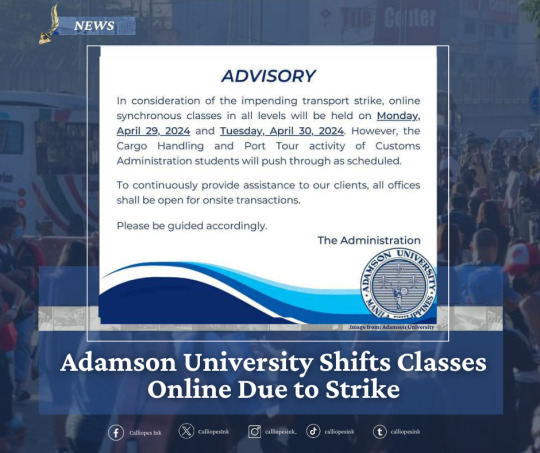
Written by: Avegail Bendoy
Pubmat by: Cathleen Jasmine Marfil
0 notes
Text
0 notes
Text
During a hearing conducted by the House Committee on Transportation, Antipolo Rep. Romeo Acop cautioned the DOTr and Land Transportation Franchising and Regulatory Board (LTFRB) against violating the rights of jeepney drivers and operators to due process and to freely associate.
The hearing is part of the House’s motu proprio investigation into issues surrounding the PUVMP, which seeks to phase out traditional jeepneys in favor of Euro-4-powered vehicles. The first phase requires the consolidation of franchises into cooperatives and corporations supposedly to help streamline PUV routes as well as to allow drivers and operators to avail themselves of government subsidies and loans to purchase modern jeepneys.
During the hearing, transport groups Piston and Manibela told lawmakers that several of their members were not only blocked from registering their vehicles despite the three-month extension, but also had their vehicles impounded by the Land Transportation Office.
In addition, jeepney drivers like Lito Andal who joined the nationwide strikes against the PUVMP last year were suddenly slapped with show-cause orders supposedly for “failing [to do] their duty” to serve the people by not plying their routes, a requirement under their respective franchises.
ACT Teachers party list Rep. France Castro also brought up cases in which some jeepney drivers who complied with the consolidation requirement were not allowed to take out loans to buy new units as they did not meet the banks’ three-year minimum requirement for consolidation.
In light of these, 1-Rider party list Rep. Bonifacio Bosita accused the agencies of abusing their police power to coerce drivers and operators to consolidate.
2024 Feb. 1
0 notes
Text
OneNETnews EXCLUSIVE: Local Transport Group in Negros Oriental opts out of Nationwide Transport Strike ensures continued operation amidst challenges of PUJ Modernization Programme
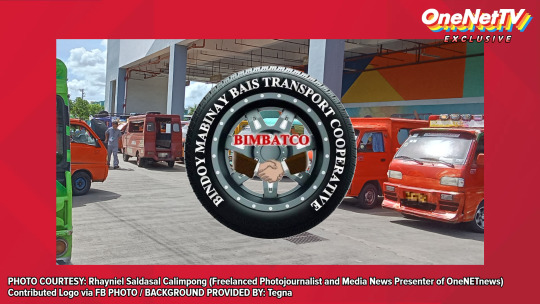
DUMAGUETE, NEGROS ORIENTAL -- National transport groups, namely the Malayang Alyansa ng Bus Employees at Laborers para sa Karapatan sa Paggawa (MANIBELA) and Pagkakaisa ng mga Samahan ng Tsuper at Operator Nationwide (PISTON) declares a nationwide transport strike on Sunday (November 19th, 2023), which is for the unconsolidated individuals. However, Central Visayas-wide including Cebu, Bacolod, Dumaguete City and Negros Oriental, have chosen not to partake in this regional transport strike during the upcoming Holiday and New Year's Eve celebrations in the early first weekend of 2024.

(FILE PHOTO COURTESY for REPRESENTATION: Negros News Online)
Romeo Subaldo, a former News Chief of ABS-CBN Bacolod (now Kapamilya Channel: Bacolod) and current Regional Multimedia News Anchor of Favorite Music Radio & Digicast Negros, shared his insights on the matter during the final minutes of his local radio newscast of 'Arangkada Negrosanon Balita' at 6:30am on Monday morning (Bacolod local time). Subaldo emphasized that the jeepney franchises in Western Visayas and Negros Occidental will not participate in the regional strike: "I think sa mga probinsya po na sang Transport Strike sa Metro at Mega Manlia, wala ma gupod ang mga provinces naton… Sa mga taga-Metro at Mega Manila nila ng Transport Strike, kana ka nausang Department of Education (DepEd) kahapon ng Linggo (Nobyembre 19th, 2023) na way klase sa Maynila na may Transport Strike. Pero diri sa aton, padayon na pag-biyahe sa mga di pa-pasaherong mga salakyan", Subaldo said in the exclusive radio interview to OneNETnews via Facebook LIVE video.
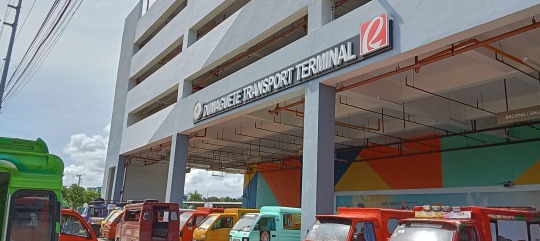
In an exclusive phone patch interview, where it was independently verified to OneNETnews as one local transport group in-charge of Bindoy-Mabinay-Bais Transport Cooperative (BIMBATCO) named Rey Alpeche, a representative in-charge of the Bindoy-Mabinay-Bais Transport Cooperative (BIMBATCO) in Dumaguete City and Negros Oriental, confirmed that they are not part of the nationwide transport strike. Alpeche highlighted the importance of paperwork consolidation and their close monitoring of the cooperatively-owned jeepney units: "So far in Negros Oriental, maliliit lang yung persiyento ang unconsolidated. Sa aming kooperatiba, lahat kami consolidated [ng BIMBATCO] na single indibidual mga sa tingin ko siguro, mga 20 to 30 ganun. Lahat naman na cooperatiba dito is nag ko-consolidate, hindi kami sasali sa transport strike. Ano naman silbi kasi consildated na po kami. I'm meaning to say that, hindi po talaga phase out dere-diretso. Yung ang unconsolidated ng kina-kansela na prankisa nila o franchise", Alpeche said in an online media interview on Friday afternoon (December 29th, 2023).
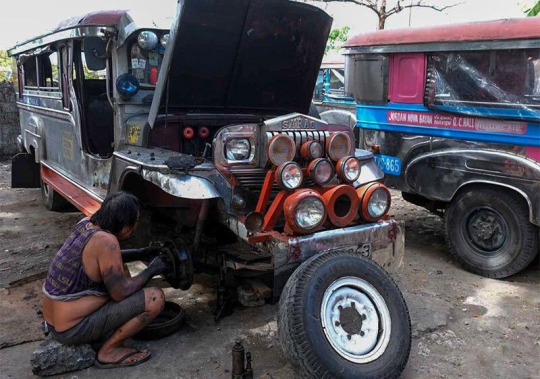
(CONTRIBUTED FILE PHOTO COURTESY for REPRESENTATION: The Philippine Star)
He emphasized that their cooperative of BIMBATCO is already consolidated and therefore unaffected by the phase-out of older jeepney units in Negros Oriental. While concerns regarding commuting without modernized jeepneys in the future, and the availability of unemployment benefits were raised from the SSS or GSIS (Social Security System or Government Service Insurance System), Alpeche clarified that these issues do not directly impact BIMBATCO and other localized transport groups: "Yung amining nila ng gobyerno is to consolidate. Consolidation is yung mga papeles ng iko-consolidate kasi hindi na po biro na yung gobyerno na for example… Hindi kaya ng LTFRB o Land Transportation Franchise and Regulatory Board na mag-monitor ng indibidual na prangkisa o operators. Kailangan mo i-monitor yung sa kooperatiba kasi, yung sa sinabing cooperative ay mo-monitor ng mga [Jeepney] units", he added.

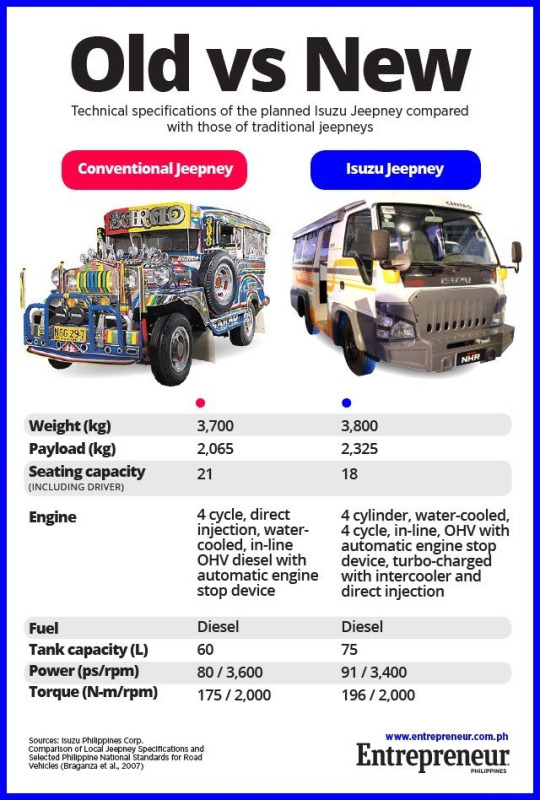
(FILE PHOTO COURTESY: Google Images)
Loans in Negros Oriental, with the example of government-owned banking 'Landbank' cannot cover all the jeepney vehicle modernization expenses and was yet to be revisted in the Q1 of 2024 or later. Nonetheless, BIMBATCO needs to reassess areas for modernization based on its passenger volumes: "Kailangang po talaga e-revisit mo na yung [sinabing probinsya] ng Negros Oriental kasi, sa amin ngayon may modernized jeepney galing isa, taas namin kinuha yun. Ang problema, hindi talaga kaya ang umo-utang ta sa banko. Pag umo-utang pa ron, siguradong hindi na ka mababayad. Sa Negros Oriental ang problema kasi, wala po tayo mga masyadong volume ng pasahero o passengers. So, kailangan po naming na e-revisit muna yung every area na kailangan na modernisasyon".
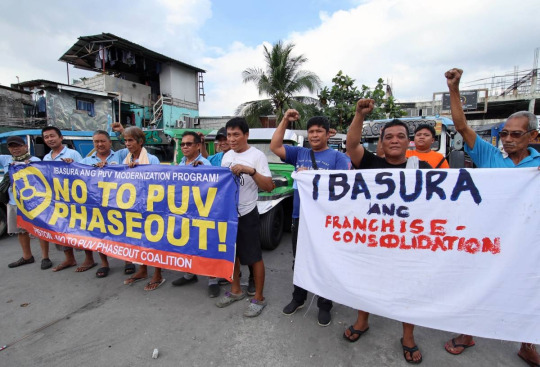
Alpeche suggested that if drivers were to become unemployed and experience a decrease in income for commuting purposes, they would need to be re-hired, despite of the upcoming nationwide transport strike including Negros Oriental. He expressed the drivers' resistance to the boundary system and emphasized that drivers earn more than the operators themselves: "Meron nang dahan-dahan na tayong phase-out, yung mga driver din yun is ire-hire din. Saan pong kami kukuha ang driver sa kanila rin? Kasi ayaw ng mga drivers na itong nangyari. Ayaw kasi ng mga drivers is boundaring system yun ng mga drivers. Mas malaki pa yung kita kaysa sa operator".
The consolidation process for BIMBATCO began in 2018 or 2019 and was soon to expire by 2024, as early as 6 years before the December 31st, 2024 deadline on Sunday. Ferdinand "Bongbong" Romualdez Marcos Jr. stated that there would be no extensions for the nationwide and regional jeepney phase-out for the unconsolidated individuals, urging sincerity from the government. He also pointed out the lack of communication with the Land Transportation Franchise and Regulatory Board (LTFRB) in Negros Oriental: "Dapat unahin natin yung LTFRB, we do talk with the cooperatives na kabisado yung ruta. Kasi, kami ang nakakaalam so ruta kung pwede bang dagdagan, pwede bang tanggalan ng [Jeepney] units at i-modernize. Kasi, kami yung apektado at kami yung may alam pero, pag wala namang threat nandito sa Negros Oriental sa ngayon, hindi nai-tolerate yan. We don't talk to the government. At saka, pag wala pang consolidation po sa kanila ng ilang taon na palaging ine-extend, paano naman kami which is so unfair for us na hindi na ko-consolidate as early as 2018 o 2019, na palagi sinabing ine-extend. Pag ayaw talaga ang consolidasyon, ayaw na din talaga ng extensyon". Alpeche expressed frustration with the extension of consolidation deadlines and the unfair treatment of cooperatives that have already consolidated to them. Alpeche expressed frustration with the extension of consolidation deadlines and the unfair treatment of cooperatives that had already consolidated.
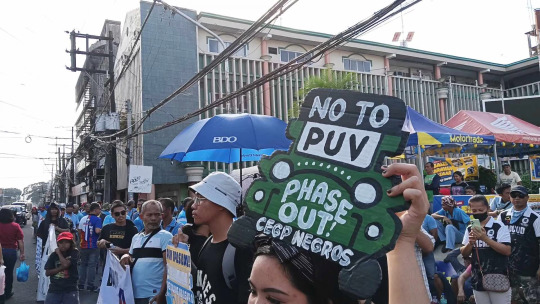
(FILE PHOTO COURTESY: Bayan Negros)
Fortunately in conclusion… Western and Central Visayas, including Negros Occidental and Negros Oriental, are not participating in the regional transport strike. BIMBATCO has ensured the necessary paperwork and franchises to secure the continued operation of their regional vehicle franchises without any revocations or phasing out in the new year by January 1st, 2024.
The transportation crisis in Metro and Mega Manila is a significant concern for MANIBELA and PISTON. Drivers are pushing for the modernization of new jeepney vehicles under the Public Utility Jeepney & Public Utility Vehicle - Modernization Programme (PUJ/PUV-MP) as a last resort to preserve the driving culture associated with older jeepneys. However, individual Filipino drivers cannot afford this potential upgrade.
OneNETnews has learned that Negros Oriental will no longer participate in the local transport strike for now, as confirmed by Alpeche of BIMBATCO. They have sought legal assistance to ensure proper registration and consolidation by the Land Transportion Office (LTO) and LTFRB, allowing them to operate safely and normally in Central Visayas.
A big SPECIAL THANKS to Neil Ceriño Rio of DYGB-FM 91.7 MHz's Power91FM and Fil News Balita: Cable TV 6 in Dumaguete City for their assistance in contacting BIMBATCO and facilitating our phone patch interview and local news report. Also, you can listen a full phone patched interview provided below the source links. Thank you!
PHOTO COURTESY: Rhayniel Saldasal Calimpong (Freelanced Photojournalist and Media News Presenter of OneNETnews)
CONTRIBUTED LOGO via FB PHOTO
BACKGROUND PROVIDED BY: Tegna
SOURCE:
*https://archive.org/details/onenetnews-interviews-with-bimbatcos-rey-alpeche [Exclusive Audio Interview from OneNETnews with Rey Alpeche - Dec292023]
*https://www.topgear.com.ph/features/feature-articles/puv-modernization-program-jeepney-phaseout-guide-a4354-20230310-lfrm [Referenced Editorial News Article via Top Gear Philippines]
*https://www.rappler.com/voices/ispeak/analysis-rethink-public-utility-vehicles-transportation-modernization-focus-commuters/ [Referenced Editorial News Article via Rappler]
*https://www.pna.gov.ph/articles/1213731 [Referenced News Article via Philippine News Agency]
*https://mb.com.ph/2023/11/20/iloilo-city-unaffected-by-transport-strike [Referenced News Article via Manila Bulletin]
*https://watchmendailyjournal.com/2023/12/09/transport-strike-mulled-bacolod-transport-group-protest-vs-franchise-consolidation/ [Referenced News Article #1 via Watchmen Daily Journal]
*https://watchmendailyjournal.com/2023/12/13/impending-phase-2-transport-groups-bacolod-refuse-join-transport-strike/ [Referenced News Article #2f via Watchmen Daily Journal]
*https://www.sunstar.com.ph/cebu/cebu-transport-groups-will-not-join-3-day-strike [Referenced Mini News Article from SunStar: Cebu]
*https://www.facebook.com/100063703909926/posts/668507635282694 [Referenced FB News Article via The NORSUnian]
and
*https://www.facebook.com/107637454505360/posts/107640491171723 [Contributed BIMBATCO Logo via FB PHOTO]
-- OneNETnews Team
#local news#dumaguete#negros oriental#central visayas#public utility vehicle#public utility jeepney#culture#commuting#PUJ Modernization#PUV Modernization#transport strike#MANIBELA#PISTON#BIMBATCO#jeepney#phase out#awareness#fyp#exclusive#first and exclusive#OneNETnews
0 notes
Text
Para po! Para Po Sana sa Tao, Huwag Isantabi!
BAJ 2-A
Camacho, Cristine Grace
Mauricio, Daniela
Pillosis, Jade Alyssa
Vasquez, Mizaki Frances
Traditional Jeepneys have roamed the streets of Manila since World War II. They have been part of our culture for such a long time that they have been our identity. Colorful, unique, and very Filipino. But this last week of February hasn't been very kind to the jeepney community. The Land Transportation Franchising and Regulatory Board (LTFRB) has announced that jeepney operations will be halted after June 30, 2023 unless they have joined a cooperative or cooperation. This has sparked into such an enormous debate and has been continuously receiving backlash from drivers, commuters, and the like. Due to this, jeepney drivers came together to plan a transportation strike. They protested by not providing jeepney service for a whole week.
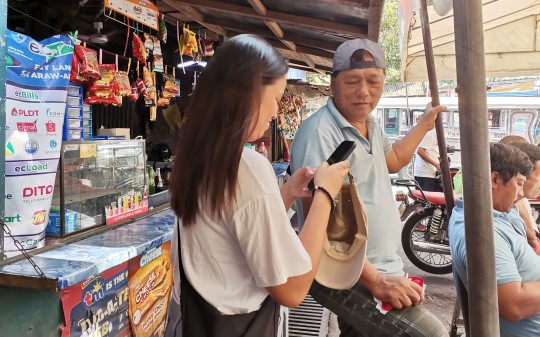
Mizaki Frances with Tatay Fernando. Photo by Daniela Mauricio
The simplest solution would appear to be to simply replace old, inefficient jeepneys with newer, more energy-efficient ones. However, it also has drawbacks. The drivers of jeepneys are the main beneficiaries of this PUV modernization. Tatay Fernando, a jeepney driver, said that since it is their main source of income, "Syempre malungkot, hanapbuhay namin yon. Mawawalan kami ng hanapbuhay. Kahit sarili mo yung jeep, kapag nawala yon wala ka ring hanapbuhay." They will lose their jobs as a result of the phase-out, and their families will go hungry.
Many jeepney drivers oppose the government loan being offered. Due to the numerous requirements, they are unqualified, and Tatay Lauro, a jeepney driver, claims that he is old enough to be in debt to the government. When he tries to calculate how much money he makes by driving a jeepney, he believes he won't be able to pay.
Along with the drivers, commuters also sympathize with the situation of the jeepney drivers. Commuter Sheryl claims that because the fare would increase if the jeeps were phased out, she would prefer a cheaper fare. The greater problem the government must address—rather than the phase-out—is the continuation of high jeepney fare levels. Despite the convenience that air-conditioned buses provide, an extra fare will be a burden for e-jeeps that employ air conditioning.
While it is evident that the jeepney drivers and commuters will be the most affected by the looming PUV Modernization, there are still more people who will be affected by the implementation. People unseen despite them being in plain sight. Those are the vendors and sellers in the terminals and areas where jeepney drivers pass by or rest.
For instance, at the Sta. Maria Terminal, there are many kinds of sellers and vendors there. From street food vendors to carinderias, whose livelihood depends on the commuters and jeepney drivers. Those are the lives that will be hugely affected by the PUV modernization. What would happen to them when the terminal where they get their livelihood from could possibly disappear? Are there guaranteed companies who would hire them?
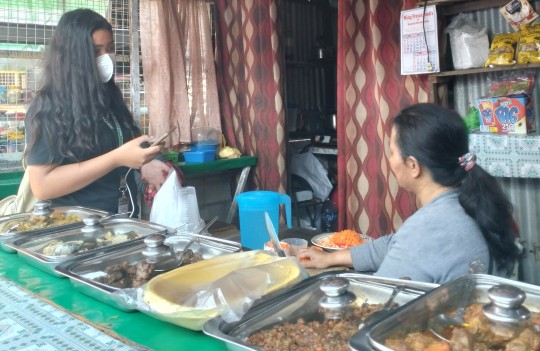
Jade Pillosis with Teresita, a carinderia vendor. Photo by Mizaki Frances
Teresita, a carinderia vendor at the Sta. Maria Terminal, expressed that she is not certain on how she will find another source of income. “Yun ang (ano) kasi ang kabuhayan namin eh ganito lang. Hindi ko rin masabi kasi ang hinahangad ko lang eh paano ka kumita ganon lang.”
The same goes to Rogelio Villamor, one of the many street food vendors there. He said that there is no other place for them to go. “‘Di namin alam, mahihirapan kami diyan kasi wala ng biyahe eh. Wala kaming mapupuntahang iba. Mahihirapan kung saan kami magsisimula.” They have families to feed too. With the never ending increase in inflation, the cost of everything is at its all time high. Due to the lock down, these stores were forced to close as a compliance to health protocols. Now that they are slowly getting up on their feet again, they will be knocked down yet again with no assurance that there will be someone who will help them. Their voices must be heard too. Their stories are just as important as the others.
As stated by many transport groups and drivers, they are all for modernization if it benefits the environment. However, the cost of the proposed modernized jeeps were too expensive, even with the help of the government they would not be able to afford it. PUV drivers earn so little, yet the weight of the burden was on their shoulders because of a decision made by people who don’t even use public transportation.
By conducting an interview at the Sta. Maria Terminal, we were able to determine the thoughts and opinions of the people there. From jeepney drivers--vendors there. They have different views, but their collective answers towards the PUV Modernization are the same. The questions prepared by the interviewers were equipped to be answered by the opinions of the participants. There are two kinds of questions that were used, first is the Generalized Questions. These are the more general questions and the background of the participants were not relevant to these questions. The second kind is the Specific Questions, these are also the follow-up questions. Here, the background of the participants were relevant, hence these questions were specified only to them. The tables below represent the answers of the participants to the sets of questions given to them.

Table 1
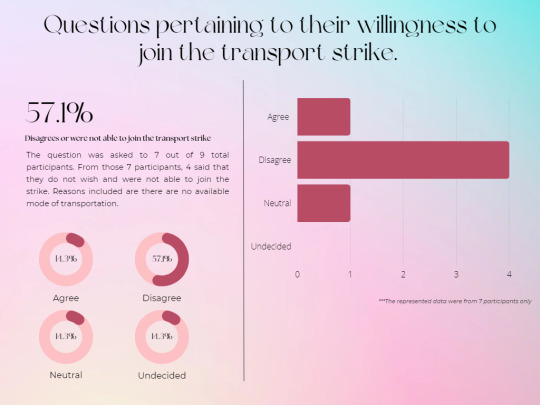
Table 2
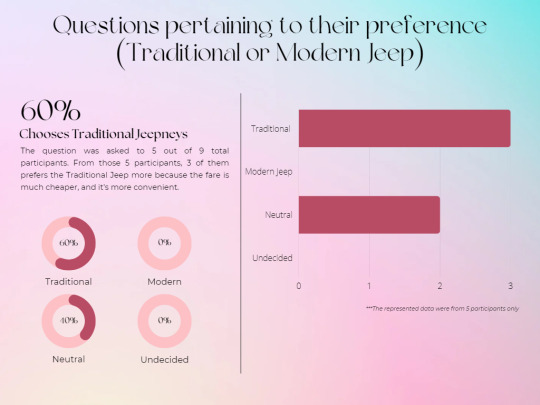
Table 3

Table 4

Table 5
The tables above shows that more people are Not in Favor of the PUV Modernization as it has negative effects not just to them as commuters, but also to the jeepney drivers as well (Table 1). And that Jeepneys, more specifically Traditional Jeepneys, Have Big Effect on their lives, hence they prefer it more than the Modernized Jeep despite it being more comfortable (Table 3 & 4). Lastly, the vendors and sellers have no idea where they will get their livelihood from, when the terminal closes due to the jeepney phaseout, and the drivers are not ready to borrow money to comply with the PUV Modernization (Table 5).
The data shows that the people recognize that this PUV Modernization has more drawbacks than advantages.
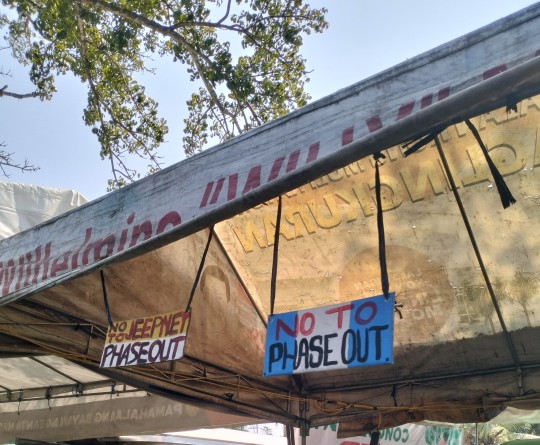
Plackards hanged on a tent at the Sta. Maria Terminal. Photo by Mizaki Vasquez.
Jeepneys have been a huge part of our lives and our collective culture as Filipinos. This traditional mode of transportation has been incorporated into our needs and has been glued into our country's identity for several decades. It is pro-people because of its cheap and affordable fares for commuters, along with the fact that various sectors are dependent on it. This includes the drivers, barkers, takataks, dispatchers, mechanics, and many more. If the looming phaseout were to happen, countless livelihoods would be at stake. It would have a negative impact on the country's transportation system and on our economy in general because thousands of jobs would be lost. The Jeepney modernization program is an ideal program in perhaps a more pro-people government. But with no proper plans and rushed implementation, it would only trample on the poor masses. There is nothing wrong with modernization; we are all for that, but in doing that, it should consider bringing the less privileged into the progression that it proposes.
0 notes
Text
LTFRB Sets New Standards For Jeepney Smoke Belchers!
MANILA, Philippines (The Adobo Chronicles, Manila Bureau) – Whenever there is an election for a new Pope, the sign that a Pontiff has been chosen is the white smoke (as opposed to black) that comes out of the roof of the Sistine Chapel in The Vatican.
This age-old Roman Catholic tradition is being adopted by the Land Transportation Franchise and Regulatory Board (LTFRB) in the Philippines…

View On WordPress
0 notes
Text
Local governments and national government agencies discuss regulating use of e-bikes and unregistered electronic vehicles
With more electric bikes (e-bikes) adding more traffic problems on national roads and highways in recent times, several local government units (LGUs) and agencies of the national government formally met to discuss regulating the use of e-bikes and the other electronic vehicles that remain unregistered, according to a Philippine News Agency (PNA) news article.
To put things in perspective, posted…

View On WordPress
#Asia#Blog#blogger#blogging#Carlo Carrasco#Department of Transportation (DOTr)#e-bike#e-bikes#e-trike#e-trikes#electric#electric bike#electric bikes#electric tricycle#electric tricycles (e-trikes)#electric vehicles#geek#governance#Land Transportation Franchising and Regulatory Board (LTFRB)#Land Transportation Office (LTO)#Metro Manila#Metropolitan Manila Development Authority (MMDA)#National Capital Region (NCR)#NCR#news#Philippine News Agency (PNA)#Philippines#Philippines blog#PNA.gov.ph#public service
0 notes
Text
Group slams LTFRB over ‘urong-sulong’ statements on new TNVS slots
MANILA, Philippines — A group representing workers of transport network vehicle services (TNVS) slammed on Friday the Land Transportation Franchising and Regulatory Board (LTFRB) for going back and forth on its pronouncements about the plan to open 100,000 new TNVS slots.
Laban TNVS President Jun de Leon called out the “urong-sulong” or back-and-forth statements of LTFRB which, he said, “only…

View On WordPress
0 notes
Text
Modern PUJs ply Nova-Valenzuela route anew
#PHnews: Modern PUJs ply Nova-Valenzuela route anew
MANILA – As Metro Manila reverted to general community quarantine (GCQ), at least 23 modern public utility jeepneys (PUJs) of the Novaliches-Malinta Jeepney Transport Service Cooperative (NMJTSC) have resumed plying the Novaliches (Quezon City)-Malinta (Valenzuela City) route.
NMJTSC general manager Helen Reponia-Viloria told the Philippine News Agency (PNA) on Friday that their air-conditioned PUJs stopped operation on August 4 after President Rodrigo Duterte placed anew the National Capital Region and the provinces of Bulacan, Cavite, Laguna and Rizal under modified enhanced community quarantine (MECQ).
With the shift to GCQ, she said they have undertaken steps to comply strictly with the guidelines of the Department of Transportation (DOTr) and Land Transportation Franchising and Regulatory Board (LTFRB).
The NMJTSC is enforcing safe physical distancing among its passengers. Instead of the usual 26-seat capacity of the modern PUJ, only 15 passengers are accommodated in each trip.
The passengers are also required to wear face shields, aside from face masks.
Passengers who are below 21 years old and senior citizens who are 60 years of age and above are not allowed on board.
Viloria said they charge a minimum fare of PHP11 and PHP19 for a ride from Novaliches to Valenzuela.
The modern PUJs were launched on the Novaliches-Malinta route connecting Novaliches, North Caloocan City and Quezon City and Valezuela City under the Public Utility Vehicle Modernization Program (PUVMP) of the Duterte administration.
The NMJTSC has terminals at the Shop and Ride Site in Barangay Novaliches Proper and near the Valenzuela City Hall along MacArthur Highway in Barangay Malinta. (PNA)
***
References:
* Philippine News Agency. "Modern PUJs ply Nova-Valenzuela route anew." Philippine News Agency. https://www.pna.gov.ph/articles/1112978 (accessed August 21, 2020 at 07:30PM UTC+14).
* Philippine News Agency. "Modern PUJs ply Nova-Valenzuela route anew." Archive Today. https://archive.ph/?run=1&url=https://www.pna.gov.ph/articles/1112978 (archived).
1 note
·
View note
Text
Taas-pasahe sa Pampublikong Transportasyon, Umarangkada na noong Oktubre 3
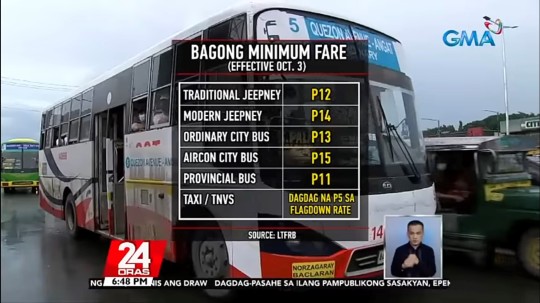
PAGTAAS NG PAMASAHE. Epektibo na noong Oktubre 3, 2022 ang pagtaas ng minimum na pamasahe sa mga pampublikong transportasyon tulad ng dyip, bus at taxi. Larawan mula sa GMA News
Inaprubahan ng Land Transportation Franchising and Regulatory Board (LTFRB) ang pagtaas ng pamasahe sa Public Utility Vehicles (PUVs) noong Setyembre 20, 2022.
Ayon sa isang panayam kay LTFRB Chairperson Cheloy Gerafil, magiging permanente na ang pagtaas ng singil at hindi maaapektuhan ng pagtaas-baba ng presyo ng produktong petrolyo, na naglalaro ngayon sa ₱67 hanggang ₱86 kada litro. Dahil dito, magiging ₱12 na ang minimum na pamasahe sa mga tradisyunal na dyip, habang ₱14 naman para sa mga modern jeepney. ₱2 naman ang dagdag sa mga provincial at city buses, kaya’t magiging ₱11 hanggang ₱15 na ang minimum fare para rito. Tataas sa ₱35 hanggang ₱45 ang flagdown rate para sa mga taxi at Transport Network Vehicle (TNVS). Pinaalalahanan ni Gerafil ang mga operator at driver na bawal maningil ng taas-pasahe kung walang nakapaskil na bagong fare matrix sa loob ng sasakyan.
Apektado ng panukala ang mga dyip na balik-biyahe na sa loob ng UP Campus, kasabay ng pagbabalik ng face-to-face classes sa unibersidad noong Setyembre 5. Kabilang sa mga nagbalik na dyip ay ang mga biyaheng UP Ikot, UP Toki, Katipunan, Pantranco, Philcoa, at SM North Edsa. Inaasahan na makatutulong ang taas-pasahe upang mabawi ng mga drayber ang nawalang kita bunga ng dalawang taong pandemya.
Sa kabilang banda, malaking pasakit sa mga commuter ang nakaambang na taas-pasahe. Isa na dito si Kyle Garcia, isang UPIS Grade 12 student na tatlong beses sa isang linggo sumasakay ng dyip. Ayon kay Garcia, bagaman mas mabilis ang kanyang biyahe kung sasakay, mapipilitan siyang maglakad dahil sa taas ng presyo ng pamasahe.
“Naiintindihan ko kung tumaas ang presyo ng pamasahe para mas mataas ang kita ng mga jeepney drivers. Pero depende kung magkano na ang bagong presyo ng pamasahe, maaaring mas madalas na lang akong naglalakad. Ito ay dahil malapit ang mga pupuntahan ko, mas matagal ngunit mas mura na lumakad na lang.” Nang tanungin tungkol sa mga paraan kung paano mapapabuti ang serbisyong transportasyon sa UP at sa Metro Manila, sabi ni Kyle, “Sana ay [mas] patas [ang] pamasahe upang maging accessible ang pampublikong transportasyon para sa lahat.”
Nagpasalamat naman ang mga transport group sa LTFRB dahil sa naging tugon nito. Humingi naman sila ng pasensya sa mga commuter na maaapektuhan nito. “Malaki pong tulong ito na madagdagan ang aming kinikita,” sabi ni Liberty Deluna, miyembro ng Alliance of Concerned Transport Organizations (ACTO), “Doon po sa aming commuters, humihingi kami ng pasensiya sa kanila dahil kami ay humingi na naman ulit ng panibagong fare increase at naaprubahan po ito.” Epektibo na ang fare hike mula noong Oktubre 3, 2022. //ni Andre Panopio
3 notes
·
View notes
Text
LTFRB looks at ‘balanced’ higher bus rates
LTFRB looks at ‘balanced’ higher bus rates
The Land Transportation Franchising and Regulatory Board is keen on approving a petition to increase the fares for public utility buses amid the high prices of oil products after its second hearing on the issue on Thursday.
Read Full News @ Manila Standard

View On WordPress
0 notes
Text
0 notes